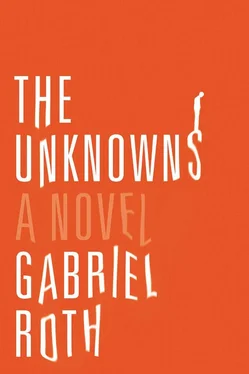Someone leaves the café, and as the door shuts it bellows a gust of cold air toward us. “You know I would never give my dad your phone number, right?”
“I didn’t mind,” he says. My dad is not the pit of guilt and confusion for Bill that he is for me. “I told him to call my agent.”
“Your what?”
“I said, All the top programmers are being handled by agents now . I told him I was represented by the Creative Artists Agency in Los Angeles.”
I can see how this has played out: my dad has called the Creative Artists Agency in Los Angeles and said he’d like to speak to the agent representing Bill Fleig, and the receptionist, a young actress with a phone-sex voice, told him they don’t have a client by that name, and he said, Sure you do, he’s a computer programmer , and she laughed her condescending Los Angeles laugh. I feel a little sorry for my dad.
Bill relates the rest of the conversation: Dad wouldn’t reveal his plan over the phone, but Bill asked where Dad was getting funding, and Dad said, We’ve got enough private money to get us to the point where the revenues kick in . This sets a little bug of anxiety nibbling at my stomach lining. Bill asks me about the business plan, and I tell him I’ve signed an NDA. I wouldn’t care — it’s not like my dad is going to sue me — but Bill has made enough fun of my dad today, and I don’t need his opinion of the online stereo market.
My espresso has cooled enough to drink. I drain the tiny cup and head to the counter for another, mostly to precipitate a break in the conversation. Café Florio is a one-man show, and the line backs up and snakes around the tables. I stand behind a family of tourists from England and two young women in office attire, one white, one Asian. The shiny devices behind the counter burble and hiss. What is my dad talking about when he says private money ? I shouldn’t care about my dad’s money now that I have my own, but when I was growing up, my father’s bank balance was central to my parents’ abiding conflict — and, I was led to believe, to my survival — and I feel instinctively protective of it. The two office girls push past me with their drinks, and Florio takes my order.
When I finally rejoin Bill, he’s on the brink of collapse: his arms are splayed out across the tabletop, and his head is cocked at an angle that exaggerates his long neck and makes him look like a stork. Recognizing that further attempts at conversation will be futile, I turn and watch the two girls leave with their lattes. The Asian one is chubby and kind of pretty, and I realize that I may never have to hit on anyone again.
If not for Cynthia and her misplaced faith in me I would have ignored Bill’s email, in which case I’d probably still be living with my mom and working for MoneyWire. They hired me to work on something they called Project Tyrannosaurus, presumably because it sounded cooler than Project Rewrite the Transactions Code from Scratch. It was a death march. The original system had been written almost twenty years earlier, and since then hundreds of new features had been added by dozens of successive programmers, like a medieval cathedral built by five generations of stonemasons. The resulting contraption worked, just about, thanks to patches and voodoo. (Every night we rebuilt the database, an operation that tied up the servers for twenty-five minutes. No one could explain why except to say that terrible things happened when we didn’t.) There were layers written in obsolete dialects, subroutines that existed only to avoid problems with discontinued hardware, Y2K fixes that bottlenecked every operation. Everything we added broke something else, usually something in a completely different part of the code, and just identifying the point of collapse often took days. It seemed likely that we would work on Project Tyrannosaurus until we died, and our replacements would discover our contributions, our hacks and workarounds and abandoned attempts at efficiency, and curse our names as we cursed those who had come before us.
My third week at MoneyWire, while I was getting up to speed on the codebase, I found a bug that lowballed the company’s commission on transactions into Hungarian forints by about 2 percent. I fixed it in ten minutes (the hard part with some bugs is finding them) and showed it to Kevin, the project manager. I had just saved the company approximately the cost of my salary and benefits in perpetuity.
“Holy shit,” Kevin said, standing over my shoulder and squinting at the screen. “Don’t mention this to anyone or they’ll have a fucking cow.”
“Kevin, I just fixed it,” I said.
“Yeah,” he said, “but they’ll think it was our fault in the first place.”
Kevin’s management style involved the imposition of hopelessly ambitious, allegedly unbreakable deadlines for each stage of the project. The fact that we were always on a deadline, and had blown all the previous deadlines, enabled him to keep us on a permanent emergency footing. The night I received Bill Fleig’s email, for instance, I didn’t make it home until 10:38. On my way to my room I saw through Mom’s open doorway that she’d fallen asleep sitting up in bed, her head lolling, the paperback in her hand flopped open. I crept in and set the book on the end table, then turned off the bedside lamp. “Mmm,” she said, without changing position. In the morning she would complain about having slept in her contacts again.
In my room I checked my email, expecting nothing but nightly digests from mailing lists devoted to open-source projects. I almost didn’t notice the message from wdfle@mit.edu among them.
Bill’s message was brief. It didn’t say how he’d gotten my email address, or ask how I’d been, or describe the idea that was motivating him to drop out of MIT to move to California and found a company, or explain why he was proposing to do so with someone who had rejected his friendship. Despite these lacunae, the email reopened certain possibilities, such as happiness and California, that I had given up on. I had worked hard to inure myself to their appeal, and for an email to dangle them in front of my face felt like a cruel and personal form of spam. Why did Bill Fleig always show up when you didn’t need him? I selected the email and clicked the Delete button.
Bill’s proposal would have vanished from my mind if Cynthia hadn’t come home for spring break the following weekend. At her parents’ kitchen table we talked about life at Wesleyan, her latest romance, the brutal organic-chemistry class that would keep her from applying to medical school. I hoped she wouldn’t ask me anything about myself.
“So are you applying to CU?” she said.
That had been the plan. The brochures and forms had arrived in the mail but I couldn’t bring myself to fill them out. I’d investigated scholarships at Stanford and elsewhere, but the development offices told me I wasn’t eligible thanks to my father’s financial state: a decent salary, not bankrupt, just a lot of debt. They wouldn’t take into account the fact that he wasn’t going to give me any money. They couldn’t, or everybody’s father would try it.
“I’m not really thinking about college right now,” I said.
Against all the evidence Cynthia interpreted this optimistically, as proof that I had some brilliant and unconventional alternative in mind. “So what are you going to do?” she said.
“I might start an Internet company,” I said. It was just something to say, splitting the difference between a joke and a sense of possibility. I didn’t want to disappoint her.
“That’s so great!” she said. “What’s it going to do?”
So I had to continue. “You remember that kid Bill Fleig from MLK?” I said. “He wants me to work on something with him.”
Читать дальше












